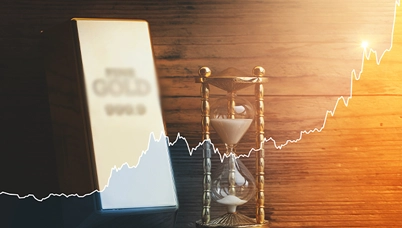Could the 2020 decade mark the end of a monetary era?
Posted On Monday, Mar 09, 2020
Historically, currencies have enjoyed reserve currency status for a cycle of nearly 100 years. Dollar dominance having reached the end of the cycle, the question facing us is will that be true for the dollar too?

THE WHAT
1) Central banks around the world have been stocking up on gold and diversifying their reserves away from the dollar, with Russia and China taking the lead. Share of the dollar in total central bank reserves has reduced from ~72% in 2001 to ~61% in Q32019 as per IMF data.

2) Usage of dollar in international payments has been declining since the last three years. From 45% share of global SWIFT payments in April 2015, the dollar’s share has declined to 38% as of April 2018.This means trade has started shifting away from the dollar and countries are using other currencies / bilateral trades for payments.

THE WHY
1) Most international trade is done in dollars, thus the transactions are executed using money-transfer systems controlled by US itself. This means that when the US imposes a sanction on a country, even if other countries disagree, the US based banks that those countries need to use for transacting, won’t facilitate trading with the sanctioned country. As of 2019, the US has introduced sanctions against Venezuela, Iran, North Korea, Syria, Sudan, and Cuba. With United States very often using this currency supremacy to weaponize trade by imposing sanctions on countries it wishes to “punish”, there is growing sentiment to use national currencies and reduce dollar's influence on economies and trade.
2) With a galloping debt to GDP ratio of USA at 106.10% as of 2018, the world is slowly becoming aware of the fragile economic conditions on which the US economy stands. There are thus concerns that the trillions of dollars held by other countries could become worthless if dollar inflation sets in as a result of increased U.S. deficit spending and printing of U.S. Treasuries to support U.S. debt.

THE HOW
• INSTEX, a mechanism to facilitate non-dollar trade with Iran and avert US sanctions backed by the three largest economies of Europe – France, Germany, UK, plus China and Russia became operational in 2019
• Malaysian President announced in December this year that Muslim countries Iran, Malaysia, Turkey and Qatar are considering a barter system and use of gold to trade among themselves and counter threat of US sanctions
• In 2018, the Turkish and Iranian central banks began to trade with each other in their local currencies
• 2018 saw the launch of the Yuan denominated oil futures – the first significant threat to petrodollar since its inception in 1970s. This instrument, priced in yuan and convertible to gold indirectly promotes use of Chinese currency and has gained popularity among oil traders
• China is escalating its de-dollarization scheme further by seeking a bilateral Rial-yuan agreement with Iran
• In 2018 Venezuela’s Vice-President for Economy announced that the country is abandoning the US dollar, with all future transactions on the Venezuelan exchange market to be made in Euros
• Cross-border Interbank Payment System (CIPS) was launched in October 2015. CIPS is a worldwide, interbank payment system backed by the People’s Bank of China (PBOC), China’s central bank. Its main purpose is to facilitate the use of the renminbi globally. Numbers using the system are widely expected to increase over time
WHAT NEXT
The dollar’s current number one status is definitely under contention. But the path ahead is far from defined.
Maybe we can expect to see the international monetary system moving towards a multicurrency system where instruments like Special Drawing Rights (SDR’s) play a dominant role.
Or with countries such as China and Russia pushing for a new one-world currency which is not backed by any one nation, we could see the creation of a central bank-supported digital currency.
There is also talk about the dollar being replaced by another currency. But that seems unlikely. The Euro makes up 20% of known central bank foreign currency reserves but the chances of it becoming a world currency have been damaged by the Eurozone crisis which revealed the difficulties of a monetary union that's guided by separate political entities. Other major currencies like Yen and Pound Sterling, making up 5.6% and 4.4% of central bank foreign currency reserves respectively, are plagued with problems of their own. And in spite of China’s efforts to internationalize the Yuan, it makes up only 2% of central bank reserves currently. Thus it seems like no currency is in a state to replace the dollar on an immediate basis and there is a high probability that any real alternative may revolve around the traditional currency - gold in some shape or form.
Any of the above shifts, though stretched out over time, can be both de-stabilizing and dollar negative. Gold can serve as a hedge against both. Preserving its status as a payment instrument in world trade, gold reduces dependence on dollar and other fiat currencies and could thus become an asset of choice till the world adjusts to the changing monetary regime.
Disclaimer, Statutory Details & Risk Factors:
The views expressed here in this article / video are for general information and reading purpose only and do not constitute any guidelines and recommendations on any course of action to be followed by the reader. Quantum AMC / Quantum Mutual Fund is not guaranteeing / offering / communicating any indicative yield on investments made in the scheme(s). The views are not meant to serve as a professional guide / investment advice / intended to be an offer or solicitation for the purchase or sale of any financial product or instrument or mutual fund units for the reader. The article has been prepared on the basis of publicly available information, internally developed data and other sources believed to be reliable. Whilst no action has been solicited based upon the information provided herein, due care has been taken to ensure that the facts are accurate and views given are fair and reasonable as on date. Readers of this article should rely on information/data arising out of their own investigations and advised to seek independent professional advice and arrive at an informed decision before making any investments. Please visit – https://www.quantumamc.com/disclaimer to read scheme specific risk factors.
Related Posts
-

Understanding GIPS: The Global Standard for Performance Reporting
Posted On Wednesday, Jan 14, 2026
In the world of investing, everyone loves a good performance number.
Read More -

Equity Monthly for January 2026
Posted On Friday, Jan 02, 2026
Indian markets remained range-bound in 2025
Read More -

Gold Monthly for January 2026
Posted On Thursday, Jan 01, 2026
Gold Market Review and Outlook: 2025–2026
Read More



